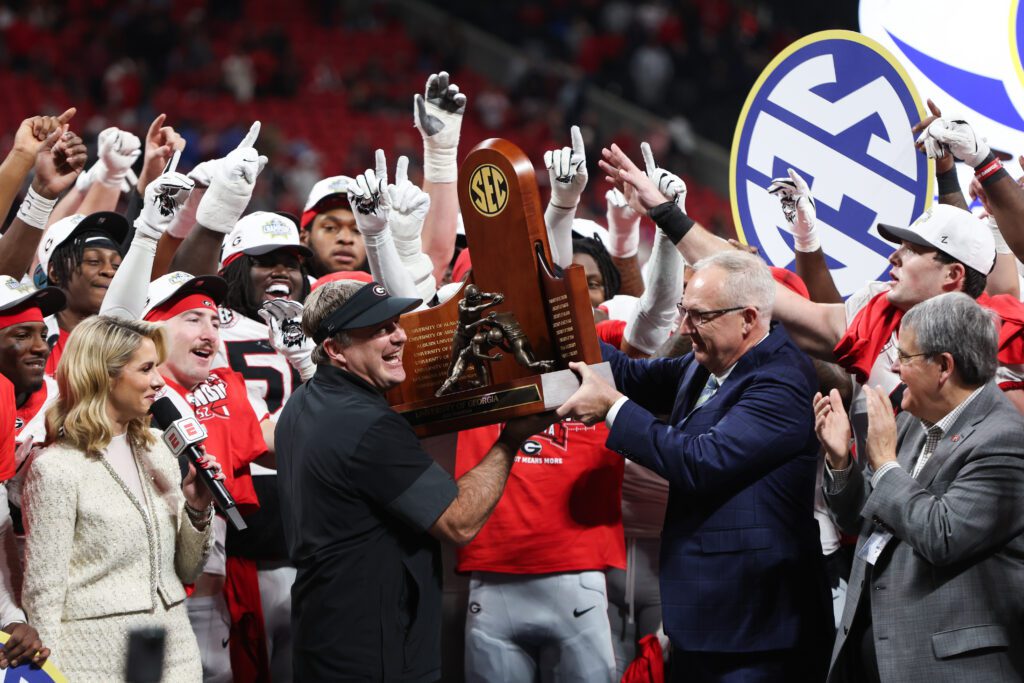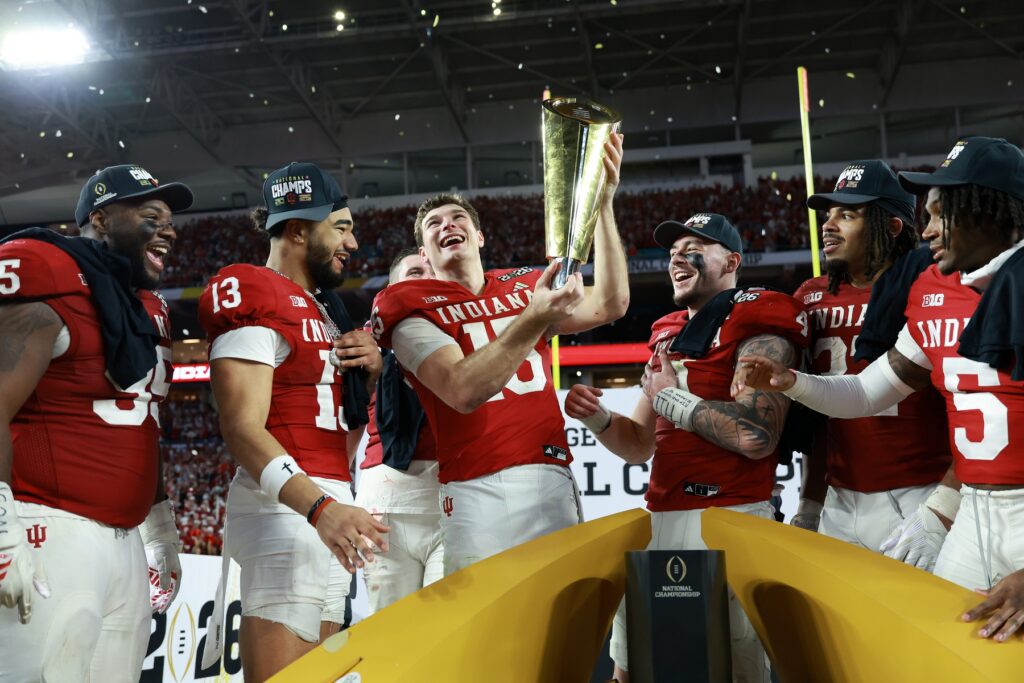Turns out that when David faces up against Goliath, Goliath tends to kick David’s butt. That’s the point of the fable, right? In the rare instances when David musters up the courage, the strength, and the proverbial stones, in order to take on competition much greater than him, more times than not, Goliath will walk away the victor. And that’s okay. It’s the once in the bluest of moons when David overcomes adversity that makes the other drubbings worthwhile to tune in for.
David lined up against Goliath on the Los Angeles gridiron on Monday night. Texas Christian University was overmatched by the college football defending champion University of Georgia Bulldogs in a 65-7 beat down, which made it pretty clear Georgia was the better team in this game.
Before the final whistle, before the confetti could even begin to fall, fans from every corner of the country and from campuses of all sorts of conferences took to social media to proclaim how wrong it was for the Horned Frogs to be in this game. How it was football malpractice on the committee’s behalf that they’d allow TCU to face what became just the fifth team in college football to repeat as national champions, dating back to 1900.
“How dare they,” bemoaned college football fans robbed of a more competitive national championship. Never mind that it was Georgia who was the one lucky to be there. TCU beat Michigan through all four quarters to advance to the final. Whereas Georgia got an invitation to the finals by the skin of their teeth and by the grace of a shanked last-second field goal. Still, there was a feeling that an otherwise stupendous main course of a season only to be ruined by a dessert that was done way too quickly.
In a couple of years, the playoffs will expand beyond four teams to twelve. Perhaps this will be an opportunity to reward more teams in the same ilk of a TCU (such as this year’s Tulane) by adding a game on their schedule against another Georgia (such as this year’s Alabama). All of this is done in the faulty pursuit of trying to explain that which is by its very nature unexplainable. There is a collective effort to categorize and structure an organism that is beautifully amorphous. In the process of dissecting a sunset, we are demystifying it, rather than appreciating the universal, glowing sensation it provides.
The expanded playoffs–from two to four to twelve–are not about really crowning the number one team in college football, because that was never the point of college football. The playoffs are a means of extracting dollars from advertisers and packaging a sterile, lame-duck conclusion of a season to football fans. The playoff committee will try to contextualize a complete body of work, then distill it down to a few data points of what they deem really matters, regardless of whatever euphoric or gut-wrenching moments took place over the prior twelve games.
We’ve lost the plot on what makes college football so great, all so we can bash our heads against the wall trying to make college football fit in a tidy little box. Go to any tailgate from Baton Rouge, Louisiana to Corvallis, Oregon, and you’ll find that things like “order” and “structure” are not what is being cherished.
So if you think widening the playoffs and criticizing a team like TCU’s amazing season is the solution, I propose that the playoffs have actually created a deeper problem.
4 Real Reasons College Football Is Special
1. Embrace The Chaos
What do you remember about previous March Madness’s? Do you only care about who is the last team to cut down the nets? Or do you remember teams like Saint Peters, UMBC, Florida Gulf Coast University, George Mason, or Oral Freaking Roberts? Those are the games you lodge into your memory and dust off when thinking of the best moments in March. College Basketball’s National Championship seems pretty quaint in comparison.
The same can be said for college football. The upsets are what make the sport so spectacular. Purdue against any top-ranked team provides must-see spoiler-making TV! Even the near-upsets are things of beauty. The shootout at the beginning of this season between Appalachian State (noted chaos agent of college football) against in-state foe UNC! What about when Alabama marched into the 40 acres to square off against the University of Texas and nearly lost to their backup? These kinds of games are the lifeblood of college football. Once we start discounting their importance, the sport’s passion is at risk of bleeding out.
2. Fanbases Have A History Of Crowning Their Own Champion Anyway
In 1962 Ole Miss completed their only undefeated football season, beating Arkansas in the Sugar Bowl to cap it off. Their stadium pays tribute to this team by calling themselves National Champions, despite finishing third in the AP poll that year. The University of Southern California finished first in the polls after beating Wisconsin in the Rose Bowl. Try convincing anyone in Oxford the real national champion was on the other end of the country that year.
Nebraska capped off a 13-0 season in 1997, continuing their reign of dominance throughout the 90s. Except for Michigan that year finished 12-0 and felt they too were worthy of being called national champs. Both teams still claim the rights of being that year’s best team. Who’s right, the folks in Omaha or Ann Arbor? You’re guess is as good as mine.
The most recent self-proclaimed national champion is the University of Central Florida. The Golden Knights completed a perfect season in 2017 but were shut out from participating in a playoff format, specifically designed to crown one true national champion. Nevertheless, the Knights handed out championship rings and sold merch celebrating their self-proclaimed status. No one in Orlando will believe you when you tell them Alabama was the real number one.
3. The Rivalries Are What Matters Most
The first goal for any Ohio State team’s season will be to beat the University of Michigan. Everything after that is gravy. Beating your rival has been and should always be the bellwether to determine if a season will be remembered fondly or not.
Army and Navy still play each other at the end of everyone else’s regular season because that game exists outside of the confines or consequences of everyone else’s season.
With conference realignment picking up greater and greater speed, geography is being disrupted and rivalries are being dismembered. The flavor of a sport we love so much is being tarnished for the sake of added empty calories.
This year was the first time in over a decade that the Backyard Brawl took place. The animosity between West Virginia and Pitt aged like a fine wine. It was a vintage of hate and spite that goes down so smoothly. One can only hope next year’s glass contains just as much bite as this one did.
4. College Football Is Collegiate
College football is at risk of neutering itself into an apathetic caricature of itself. Around the parking lot of SoFi Stadium–the California spaceship that would be hosting the game–signs prohibited fans from engaging in any sort of tailgating. You’ve got to be kidding!
College football as a culture rests on a bedrock of nostalgia and Natural Light. While the players’ greatest moments are remembered on the field, it’s the older fans who regale the youth with those tales in the parking lots outside the very stadiums in which they occurred.
The number one customer that should be kept in mind for college football is the current student population. They are the ones in the process of memory-making while they spend their blessed four years at their chosen institution. They are the ones that have inherited the tradition, customs, and fight songs. The gameday atmosphere should be tailored to them.
College football is meant to be a beautiful mess of tradition, pride, spite, and eccentricities. When it becomes a water-downed bastardized version of itself, it becomes something less than palatable. Every other sport can be solely focused on crowning a national champion. College football’s greatness is in everything else that happens along the way.
Main Photo:



